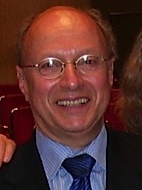Ira M. Lapidus
Ira M. Lapidus | |
|---|---|
 | |
| Born | 9 June 1937 Brooklyn, New York |
| Occupation | Professor Emeritus of History, Author |
| Nationality | American |
| Alma mater | Harvard University |
| Subject | Middle Eastern and Islamic History |
| Notable works | A History of Islamic Societies |
| Spouse | Brenda Webster |
| Website | |
| history | |
Ira M. Lapidus is an Emeritus Professor of Middle Eastern and Islamic History at The University of California at Berkeley.[1] He is the author of A History of Islamic Societies, and Contemporary Islamic Movements in Historical Perspective, among other works.
Biography and academic career
[edit]Lapidus was born and raised in Brooklyn, New York. He was born to immigrant parents, who instilled a sense of the value of education in him and his brother. He attended Jefferson High School in Brooklyn, where a history teacher helped him prepare for admissions tests and suggested he pursue Asian history studies.[2]
Lapidus went on to college and graduate school at Harvard. As an undergraduate at Harvard, he took a course in Middle Eastern history taught by Sir Hamilton Gibb. He enjoyed the class and liked the instructor, who encouraged him to pursue social sciences in addition to history. Lapidus continued taking classes in Middle Eastern and Islamic history, and upon graduation entered a career in academia.[2]
Professor Lapidus began teaching at UC Berkeley in 1965. He primarily taught courses about early Islamic history and Modern Middle East history, but also courses on the history of the Mediterranean and Islam in South and South East Asia. In graduate seminars he taught Islamic history and courses on social science concepts and methods for historians. He has trained graduate students in History, Anthropology, Near Eastern Languages and Literatures, Political Science, Geography and other disciplines. Professor Lapidus has also lectured widely to public audiences, and has frequently been interviewed for television, radio and newspaper articles.[3]
Professor Lapidus was for many years Chairman of the Center for Middle Eastern Studies at Berkeley. He is a past president and director of the Middle East Studies Association (1984), and has served on numerous professional administrative, advisory and review committees including Visiting Committees for Georgetown and Harvard Universities, the Rockefeller Foundation, and the Institute for Advanced Studies. He was a member of United States Middle East Studies delegation to People's Republic of China. He has served on the editorial boards of the Journal of Urban History, Journal of the Economic and Social History of the Orient, and the Journal of Early Modern Europe.[3]
Lapidus regularly visits Rome and other European cities with his wife, the writer Brenda Webster. Over the course of his academic career, he has done research in England, France, Turkey, Egypt, Syria, former Soviet Union, Pakistan, and India, and has traveled extensively in Muslim regions of North Africa, the Middle East, former Soviet Central Asia, India, Indonesia and western China.[3]
Photography
[edit]As well as his work in academia, Lapidus is a prolific fine art photographer whose work focuses on street scenes, city spaces, and reflections both literal and metaphorical. He has been exhibited at the A.C.C.I. Gallery in Berkeley, CA, the Club at the Claremont in Oakland, CA, the Fetterly Gallery in Vallejo, CA, and elsewhere. His work has been published in Photo Metro, Women's Studies, Fiction International, and the San Francisco Chronicle. His photos are held in numerous private collections.[4]
Fellowships, honors and awards
[edit]- Lifetime Achievement Award, Middle East Medievalists, 2001[5]
- American Philosophical Society, elected member, 1994[6]
- Fellow, Rockefeller Foundation, Bellagio Study Center, 1990[7]
His other notable fellowships include the Social Science Research Council, the Guggenheim, and Mellon Foundations, the Stanford Center for Advanced Study in the Behavioral Sciences, the Hoover Institution, the Ecole Pratique des Hautes Etudes (Paris), and the National Endowment for the Humanities.[3]
Professional associations
[edit]- President, Middle East Studies Association, 1983-84[8]
- Director, The Urban History Association, 1990-1996[9]
- Board of Directors, Middle East Studies Association, 1972–75, 1981-85[10]
- Director, Center for Muslim-Christian Understanding, Georgetown, 1992-1996[11]
Books
[edit]- Muslim Cities in the Later Middle Ages, 1967, 1984
- Middle Eastern Cities, editor, 1969
- Contemporary Islamic Movements in Historical Perspective, 1984
- Islam, Politics and Social Movements, editor (with Edmund Burke), 1988
- A History of Islamic Societies, 1988, 2002, 2014
- Islamic Societies to the Nineteenth Century: A Global History, 2012
References
[edit]- ^ "CMES Affiliated Faculty Profile". berkeley.edu. Archived from the original on 4 June 2011. Retrieved 19 December 2010.
- ^ a b "UC Berkeley interview". Archived from the original on 12 July 2010. Retrieved 19 December 2010.
- ^ a b c d Interview with Ira Lapidus, June 2013
- ^ "Ira Lapidus's photography website". Archived from the original on 3 November 2018. Retrieved 3 June 2013.
- ^ "Middle East Medievalists". Archived from the original on 27 July 2011. Retrieved 23 December 2010.
- ^ "American Philosophical Society". Archived from the original on 5 March 2012. Retrieved 23 December 2010.
- ^ "Rockefeller Foundation" (PDF). Archived from the original (PDF) on 1 July 2010. Retrieved 23 December 2010.
- ^ "Middle East Studies Association Member Profile". Archived from the original on 19 July 2011. Retrieved 23 December 2010.
- ^ "Current and past officers of The Urban History Association". Archived from the original on 18 July 2011. Retrieved 23 December 2010.
- ^ "Middle East Studies Association". Archived from the original on 16 March 2012. Retrieved 3 June 2013.
- ^ "Center for Muslim-Christian Understanding" (PDF). Archived from the original (PDF) on 21 June 2013. Retrieved 29 March 2013.
External links
[edit]- An interview with Ira M. Lapidus Archived 12 July 2010 at the Wayback Machine
- http://www.iralapidusphotography.com
